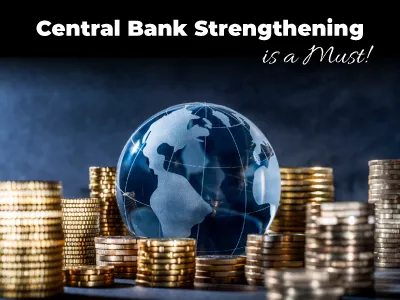
Strengthening central bank independence is essential to protect the world economy
Independence is critical to fighting inflation and ensuring long-term stable economic growth. But a wave of elections this year could pressure policymakers.
Central bankers today face many challenges to their independence. Although premature, calls for interest rate cuts are growing and are likely to intensify as half of the world's population votes this year. There is also a growing risk of political interference in bank decision-making and staff appointments. Governments and central bankers, therefore, need to resist these pressures.
Why is this important? Consider what independent central banks have achieved in recent years. Central bankers effectively managed the pandemic, unleashing aggressive monetary easing that helped avert the global financial meltdown and accelerate the recovery.
As the focus shifted to restoring price stability, central bankers tightened monetary policy as appropriate, albeit on different timetables. Their response has helped to keep inflation expectations stable in most countries, even when price increases reached multi-decade highs. Emerging markets have thus been leaders in early and robust tightening, further enhancing their credibility.
The recent success in bringing down inflation contrasts sharply with the economic instability during the hyperinflationary 1970s. At that time, central banks did not have clear mandates to prioritize price stability or clear laws protecting their autonomy. As a result, politicians pressured them to lower interest rates when inflation was high.
Everyone suffered from this period of high inflation, boom, and bust, especially people on fixed incomes who saw their real incomes and savings erode. Success in reducing inflation only came in the mid-1980s when central banks were given political support to fight inflation aggressively.
Measuring Impact
Extensive research shows the critical importance of central bank independence. An IMF study looking at dozens of central banks from 2007 to 2021 shows that those with solid independence scores are more successful in keeping people's inflation expectations in check, which helps keep inflation low.
In this sense, independence is critical and has become more dominant among countries at all income levels. Another IMF study, which tracks 17 Latin American central banks over the last 100 years, looks at factors such as independence in decision-making, clarity of mandate, and whether they can be forced to lend to the government. It also found that greater autonomy was associated with much better inflation outcomes.
The conclusion is clear: Central bank independence is essential for price stability and long-term stable growth.
However, trust is crucial to wielding enormous power in democratic societies. Central banks must earn this trust every day through strong governance, transparency, accountability, and fulfillment of core responsibilities. Strong governance helps ensure that monetary policy is predictable and based on achieving long-term goals rather than short-term political gains. It starts with a clear legislative mandate that sets price stability as a core objective.
Respecting Independence
Other branches of government have clear responsibilities to help central bankers achieve their mandated objectives and navigate the dangers ahead. This includes laws declaring independence and complying with the letter and spirit of such laws. It also means considering how other policy actions affect the work of central bankers.
Developing prudent fiscal policies that make debt sustainable helps reduce the risk of "fiscal dominance," which puts pressure on the central bank to provide low-cost financing to the government, ultimately increasing inflation. Fiscal prudence also strengthens economic stability by providing more budgetary space to support the economy when needed.
 Back
Back







